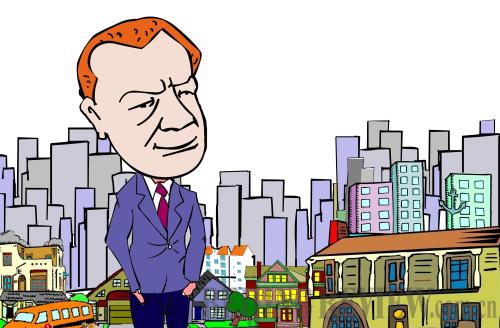|
 |
|
(LI SHIGONG) |
"German intern looking for an apartment in Xicheng District, or next to subway line 2. Budget: 2000 yuan ($316)." That was how my ad appeared in the online magazine The Beijinger. Short, crisp, with a nice photo of myself.
However, the photo perhaps was a little too nice given that I only received responses from some Chinese girls who were interested in making friends with me. Thus I stayed in a hostel.
Accommodation in Beijing's hostels is not that expensive. The Candy Inn near the Lama Temple charged 28 yuan ($5) per night in a dormitory bed. In the evening you could sit in the small but cozy common room enjoying new Hollywood blockbusters with popcorn included.
But I passed the night without sleep because of my chatting roommates and the lovely receptionist telling me that I might have to look for a new place to stay because the hostel was going to be revamped. I came to the conclusion that the Candy Inn was not a lasting solution.
I started my flat hunting on the campus of Renmin University. After seeing some really horrible, well, "caves," I saw an announcement on a pinboard and spotted the rent: 330 yuan ($51) per month.
The landlord I met was delighted about the fact that a foreigner was willing to rent the bed, which was one of six in each room of an apartment, in which 17 young men were living. I just shrugged fatalistically. Living here or in the dormitory of a hostel—what was the difference?
So I moved to my new bed the next day, to the amazement of my new roommates. Shyly they asked some questions in halting English and I tried to answer in a way that they might understand. When this didn't work, the computer helped us along.
Anyway, the computer is what keeps these poor fellows alive. They work or study during the day, and sit in front of their laptops every evening, surfing the Internet or chatting with their families in far away provinces.
But the very next morning I knew I could not stay in this place. The landlord lived together with his tenants in one of the bunk beds, where he blew out cigarette smoke through the corner of his mouth. Windows had to remain closed, one of his catalogue of rules, which expanded every day and only aimed at making the lives of his slave-tenants more difficult. "Showering is free only on Mondays and Fridays. On the other days you'll have to pay 3 yuan ($0.5)," a roommate explained to me. "And we are not allowed to use the kitchen. That's shushu's area." Shushu, meaning "uncle" in Chinese, didn't seem like a nice uncle to me; rather he appeared to be a little dictator.
When I shared my opinion with my fellow sufferers, they agreed immediately. "Nobody likes the landlord," they told me in English. "But what shall we do?" I asked Li Yugang, who earns 9,000 yuan ($1,406) a month, why he was still living here. He said, "Beijing is for career, not for living."
However, life being more important to me than my career. I kept looking and at last found a small broker's office in Xicheng District in the western part of Beijing. And really, the real estate agent Mr. Feng had an ace up his sleeve. After a race through the streets of Beijing on his electric bicycle we found a room that corresponded to my requirements. Wooden flooring, huge bed and built-in cupboard, TV—all for 2,000 yuan ($316) a month—I was in. I would even forget about the neglected bathroom and the scruffy kitchen.
Still missing an important part of the Beijing real estate market, I contacted some prestigious real estate agencies, passing myself off as a prosperous gentleman, looking for an appropriate residence. The foreigner's advantage worked and I got an appointment to view apartments in Park Avenue and Central Park, each of which is a complex of several high-rise buildings in Beijing's stylish Chaoyang District in the eastern part of Beijing. The real estate manager approached boldly. She was wearing platform boots; in her job, appearance mattered, every centimeter counted…
We had a look at some apartments. All were about 200 square meters. Otherwise there was no big difference with my apartment. Mine also has wooden flooring and the heating is also turned off on March 15—due to the fact that district heating works under the supervision of the Central Government. Bathrooms and kitchen were gleaming and through the panoramic window one had a fantastic view on the skyline of Beijing. How much does this apartment cost? "About 28,000 yuan to 30,000 yuan ($4,375 to $4,687) a month," came as response. "That's a matter of negotiation." Perhaps I should negotiate with agent Feng for such little price reductions, too?
I said goodbye to the agent and promised to get in touch within the next few days. Knowing I was going to disappoint her, I took the subway back home to my small but sweet room on the far western side of the city.
The author is a German living in Beijing
Email us at: liuyunyun@bjreview.com | 